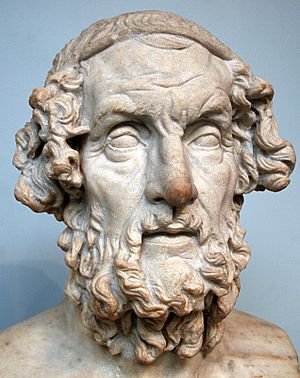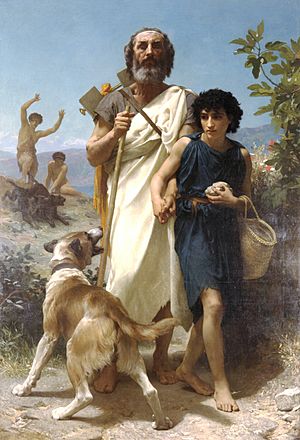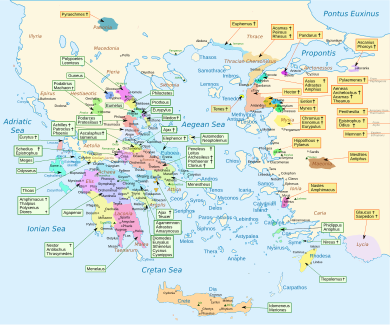Homer facts for kids
Quick facts for kids
Homer
|
|
|---|---|

Marble terminal bust of Homer. Roman copy of a lost Hellenistic original of the 2nd c. BC.
|
|
| Native name |
Ὅμηρος
|
| Born | c. 8th century BC |
| Died | Ios |
| Language | Homeric Greek |
| Nationality | Greek |
| Genre | Epic |
| Subject | Epic cycle |
| Years active | fl. late 8th cent. BC |
| Notable works | |
Homer is the name of the Greek poet. He is best known as the author of epic poems the Iliad and the Odyssey, which are among the greatest treasures of the ancient world.
Contents
The Mystery man of Ancient Greece
We don't know much for sure about Homer. Most experts believe he somewhere around the 8th century BC. Imagine trying to find information about someone who lived that long ago!
We don't have any pictures of Homer, and we don't even know for sure if he was one person or a group of people who worked together. Some people think he might have been a blind poet who could tell amazing stories from memory and recite them beautifully. Others think he might have been a singer who traveled from town to town, sharing his tales with everyone.
Some ancient scholars believed Homer to have been an eyewitness to the Trojan War; others thought he had lived up to 500 years afterwards.
The Iliad and the Odyssey
Homer is most famous for two incredibly long poems: the Iliad and the Odyssey. These poems are like really, really long stories, filled with exciting adventures, brave heroes, and scary monsters. They're so long that they're often divided into smaller parts called "books."
- The Iliad: This poem tells the story of the Trojan War, a huge battle that lasted for ten long years. It focuses on the anger of Achilles, a super strong warrior, and the terrible consequences of his rage. There are many brave heroes in the Iliad, like Hector, the brave Trojan prince, and Odysseus, the clever king of Ithaca.
- The Odyssey: This poem tells the story of Odysseus's long journey home after the Trojan War. It takes him ten years to get back to his family. Along the way, he faces many dangers, including angry gods, giant monsters like Cyclops (one-eyed giants!), and beautiful but dangerous creatures like the Sirens (creatures who lure sailors to their deaths with their enchanting songs).
Important numbers and facts
- 8th Century BC (approximately): The estimated time Homer lived.
- 15,693 lines: Approximate number of lines in the Iliad.
- 12,110 lines: Approximate number of lines in the Odyssey.
- 24 books: The Iliad and the Odyssey are traditionally divided into 24 books each.
Legacy

Homer's stories have been incredibly important throughout history. They've been translated into many languages and have inspired countless artists, writers, and filmmakers. Even today, people still read and enjoy his epic poems. They teach us about courage, friendship, loyalty, and the importance of family. They also show us the consequences of anger and the importance of making wise choices.
While we may not know everything about Homer, his stories continue to capture our imaginations and teach us valuable lessons. They are a window into the past, offering a glimpse into the beliefs, values, and adventures of people who lived thousands of years ago.
See also
 In Spanish: Homero para niños
In Spanish: Homero para niños
- Achaeans (Homer)
- Aeneid
- Bibliomancy
- Catalogue of Ships
- Creophylus of Samos
- Cyclic Poets
- Deception of Zeus
- Epithets in Homer
- Geography of the Odyssey
- Greek mythology
- Hector
- Historicity of Homer
- Homeric psychology
- Homeric scholarship
- Homer's Ithaca
- List of Homeric characters
- Peisistratos
- Sortes Homericae
- Tabula iliaca
- Telemachy
- The Golden Bough
- Trojan Battle Order
- Trojan War in literature and the arts
- Venetus A Manuscript
Images for kids
-
A Reading from Homer (1885) by Lawrence Alma-Tadema





